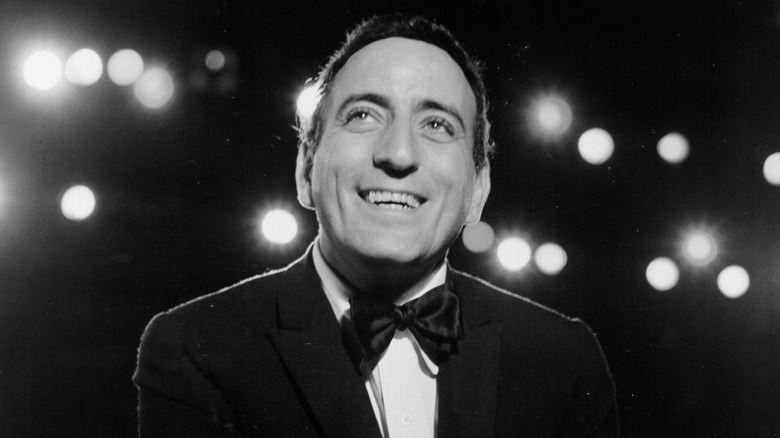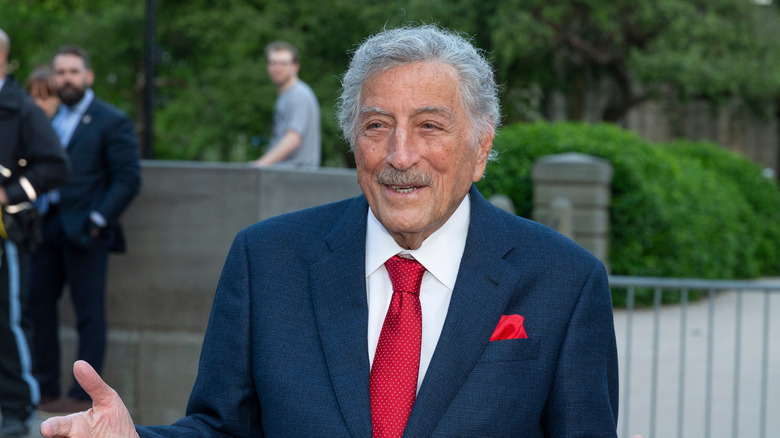The Truth About Tony Bennett's Former Connection To The Mob
Tony Bennett is in the same class of Italian American, New York-area crooners of the 1950s as Frank Sinatra. In fact, the two were close friends and greatly respected each other's artistry. "For my money, Tony Bennett is the best singer in the business," Sinatra once said of Bennett, via the New York Times. "He excites me when I watch him. He moves me. He's the singer who gets across what the composer has in mind, and probably a little more." But, while Sinatra's ties to the mob are relatively well-documented, Bennett maintained a particularly clean-cut, uncontroversial public image. Even so, Bennett was not entirely untouched by the presence of organized crime in the '50s music scene.
David Evanier's 2011 biography "All The Things You Are: The Life of Tony Bennett" covers triumphs in the singer's life, from his World War II service in the 1940s to his activity during the civil rights movement of the 1960s. But the book also explores some of Bennett's troubles, such as his misuse of cocaine and pills in the 1970s and his connections to the mob at the onset of his singing career, per the New York Daily News.
"The wiseguys controlled the clubs all across the country, from the Copacabana in New York to the 500 Club in Atlantic City," Evanier wrote. "The truth was that the mob made you or destroyed you."
While the mob had a small hand in making Tony Bennett a household name, the singer's mob ties did not manage to destroy him.
The mob helped finance Tony Bennett's career in its early days
In "All The Things You Are: The Life of Tony Bennett," biographer David Evanier wrote that Bennett's career was given a leg up with financing and nightclub access by members of Al Capone's mob "family."
"Although he wanted nothing to do with them, they were simply impossible to ignore or escape," Evanier wrote. However, the biographer also wrote that Bennett managed to "escape" his mob ties, or at least loosen them, by paying the mob $600,000 in the late 1960s, per the New York Daily News. Evanier supported this claim by citing sources including Bennett's fellow musicians and his former manager, Derek Boulton.
According to the Daily News, Bennett's son and manager, Danny Bennett, was upset about the "inaccuracies" in the way his father and his affiliation with the mob were portrayed in the biography. In response, Evanier told the outlet that he consulted more than 60 sources for the biography. He added, "There are no inaccuracies ... I celebrate [Tony], but not in a way [Danny] wants. [Tony is] not Snow White, but no one is." Despite describing Bennett as "one of my heroes", Evanier maintained that the singer's reputation was not as untainted as the public perceived. "It's not an exposé, it's a real story," he added. But while he might have had his stints of controversy, Bennett will no doubt continue to be remembered as a quintessential artist who left a lasting impact on the music scene.
Tony Bennett's found himself entangled with the mob again in the '70s
After severing ties with the mob from his earliest days in the industry, Tony Bennett found himself in trouble with another mafia group. Following Bennett's separation from his second wife Sandra Grant in the late '70s, the "Rags to Riches" singer reportedly went into a dark hole, eventually leading him to substance abuse and suicidal thoughts, as revealed by David Evanier, author of 2011's biography "All the Things You Are: The Life of Tony Bennett." In the book, Bennett reportedly also shared that the dark period was intensified by his then-financial problems and the sudden death of his mother. "I felt as if I was going crazy. I turned more and more recklessly to drugs for relief," Bennett admitted. Speaking to the New York Daily News, Evanier explained that this dark period eventually led Bennett to strike up a relationship with a woman who turned out to be Anthony Spilotro's girlfriend.
Describing Bennett's relationship with the said woman as an impulsive decision, Bennett soon found himself face-to-face with Spilotro, a popular mobster and one of the highest-ranking members of Las Vegas's Chicago Outfit. "Spilotro hammered Tony over the head with a phone book, laying him out on the floor," Evanier recounted of the encounter. The attack on Bennett's head, he revealed, was strong enough to knock the singer unconscious.
Perhaps awakened by the scary encounter, Bennett reportedly checked into rehab shortly after and was eventually able to turn his life around.



